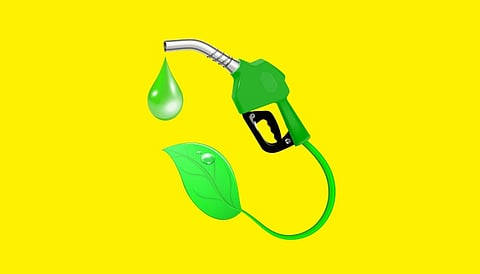
- News Updates
- PSU Watch
- Defence News
- Policy Watch
- हिन्दी न्यूज़
- Jobs Watch
- States News
- Event News

New Delhi/Ahmedabad: India's ethanol production capacity has jumped more than four times in the last 11 years of the Modi Government to 1,810 crore litres annually with the help of favourable policy initiatives, according to a senior official.
With an enhanced installed production capacity, the blending of ethanol with petrol has surged to nearly 19 percent from 1.53 percent in 2013, leading to huge saving in foreign exchange -- more than Rs 1.10 lakh crore -- as well as benefits to sugarcane and foodgrain farmers.
A senior official from the Department of Food and Public Distribution in the Central Government said that till 2013, ethanol distillation capacity in the country was only 421 crore litres.
However, the official highlighted that the ethanol production capacity in the country has reached 1,810 crore litres, thanks to policy changes by the government, including interest subsidy to set up manufacturing facilities.
Till 2013, the official said the supply of ethanol to OMCs (oil marketing companies) was only 38 crore litres with blending levels of 1.53 percent in 2013-14 ethanol supply year (ESY) that runs from (November to October).
"Production of fuel grade ethanol and its supply to OMCs has increased by more than 18 times from ESY 2013-14 to ESY 2023-24," the official said at an event in Ahmedabad.
Many ethanol plants have been set up in Gujarat with the help of Centre's interest subsidy policy.
In ESY 2023-24, about 707 crore litres of ethanol have been blended by OMCs, thereby achieving blending of 14.60 percent.
Till May 25 in current 2024-25 ESY, about 548 crore litres of ethanol have been blended by achieving blending of 18.74 percent, the official said.
During the last 11 years, the total revenue generated by sugar mills/distilleries, including grain-based distilleries stood around Rs 2 lakh crore, of which Rs 1.22 lakh crore is revenue generated by only sugarcane-based distilleries.
The Centre has notified various ethanol interest subvention schemes from 2018-2022 (in 2021 ethanol production from grain was also included under these schemes) to encourage sugar mills and distilleries to enhance their ethanol production capacities.
Under these subvention schemes, the government is facilitating project proponents to avail loans from banks/financial institutions for which interest subvention at 6 percent or 50 percent of the interest charged by the banks/financial institutions, whichever is lower, is being borne by the government for a period of five years, including a one-year moratorium period.
A new interest subvention scheme for cooperative sugar mills has also been notified on March 6, 2025 for conversion of their existing sugarcane-based plants into multi-feed based ethanol plants.
Of the total 1,810 crore litres of installed capacity, 816 crore litres are molasses based, 136 crore litres of dual feed capacity, and 858 crore litres of grain-based capacity.
Ethanol blended with petrol (EBP) programme was launched with the objectives of reducing import dependency on crude oil, conserving foreign exchange, reducing carbon emission and providing boost to agriculture sector.
The central government has been implementing this programme throughout the country wherein OMCs sell petrol blended with ethanol.
Under the EBP Programme, the government has fixed the target of 20 percent blending with petrol by 2025-26 ESY.
To achieve 20 percent ethanol blending target by 2025-26, the anticipated requirement of ethanol for blending and other uses is about 1,350 crore litres.
The National Bio-fuel Policy 2018 allows production of ethanol from sugarcane juice, sugar-containing materials like sugar beet, sweet sorghum, starch-containing material like corn, cassava, damaged food grains like wheat, broken rice, rotten potatoes (unfit for human consumption).
Besides, the policy also allows use of surplus foodgrains for production of ethanol under the EBP programme with the approval of National Bio-fuel Coordination Committee (NBCC).
In November 2020 the NBCC allowed production of ethanol from rice available with FCI and from maize for blending with petrol under EBP programme.
NBCC, in November 2023, has also allowed production of ethanol from feedstocks such as residual sugar/sugar syrup/sweeteners/best before date (BBD) products (beverages, juices, etc).
(PSU Watch– India's Business News centre that places the spotlight on PSUs, Bureaucracy, Defence and Public Policy is now on Google News. Click here to follow. Also, join PSU Watch Channel in your Telegram. You may also follow us on Twitter here and stay updated.)
